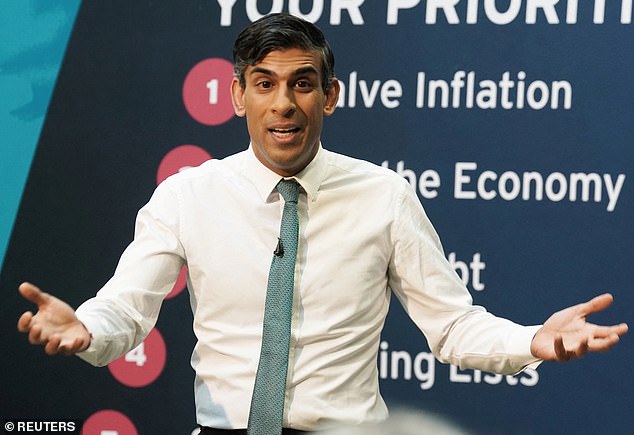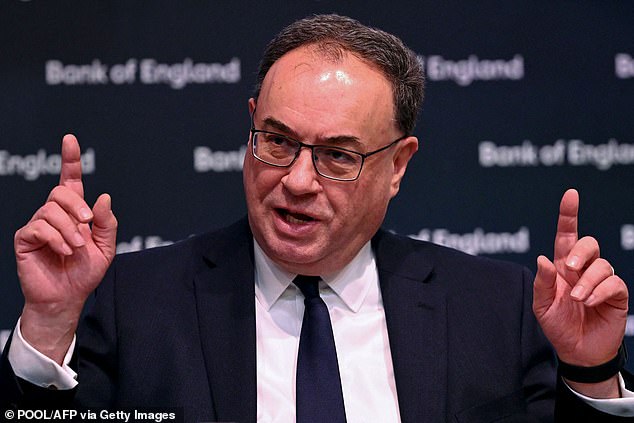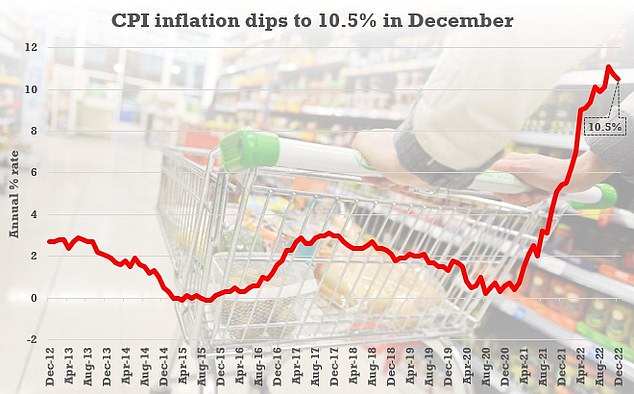Business chiefs clamour for action after Bank of England governor gives upbeat verdict on economy

Rishi Sunak faced fresh pressure to cut taxes last night after the Bank of England said Britain had ‘turned a corner’ on inflation.
Business leaders and Tory MPs stepped up calls to cut the record tax burden at the upcoming Budget, amid rising optimism that surging prices were starting to abate.
The Prime Minister risked a backlash yesterday by suggesting only ‘idiots’ would not understand why he was refusing to cut taxes when inflation remained high and the public finances were still recovering from Covid spending. But Bank of England governor Andrew Bailey put a more optimistic gloss on the economic outlook.
He said Britain had ‘turned a corner’ on the cost of living after the headline inflation rate dipped to 10.5 per cent this week, adding that the Bank now expected it to ‘fall quite rapidly this year’.

Rishi Sunak faced fresh pressure to cut taxes last night after the Bank of England said Britain had ‘turned a corner’ on inflation. The Prime Minister risked a backlash yesterday by suggesting only ‘idiots’ would not understand why he was refusing to cut taxes when inflation remained high and the public finances were still recovering from Covid spending

Bank of England governor Andrew Bailey (above) put a more optimistic gloss on the economic outlook.He said Britain had ‘turned a corner’ on the cost of living after the headline inflation rate dipped to 10.5 per cent this week, adding that the Bank now expected it to ‘fall quite rapidly this year’
And he suggested the UK was set for an ‘easier path’ out of recession than had been predicted. Mr Bailey said energy prices had ‘started to come off and gas prices quite a lot actually’ over the past few months, adding that while this ‘isn’t actually yet feeding through’ into inflation ‘it will do’.
Analysts Cornwall Insight predicted that average energy bills could dip below £2,000 by the autumn, potentially saving families huge sums, and slashing billions off the cost of state support schemes.
Senior business figures yesterday backed a warning from industrialist James Dyson that the private sector was being ‘handicapped and targeted to pay ever higher tax bills’.
Sir James said that the Government must ‘incentivise private innovation and demonstrate its ambition for growth’. In an outspoken attack, he criticised ministers’ ‘short-sighted’ and ‘stupid’ approach.
Fellow entrepreneur Luke Johnson said he ‘agreed with every word’ from Sir James, adding: ‘He understands business, innovation and job creation better than the entire Cabinet put together.’

The Office for Budget Responsibility says the November Budget will raise the tax burden to 47 per cent of GDP – up from 39 per cent before the pandemic and the most since 1945. Treasury insiders suggest Chancellor Jeremy Hunt is not considering tax cuts while he focuses on inflation
Advertising mogul Sir Martin Sorrell said it was ‘critical’ to set out a long-term plan for growth after tax hikes last year. ‘When you are faced with a very difficult situation people will accept that there had to be a difficult period for a short time but only if you give them a long-term vision,’ he said.
Clive Watson, chairman of the City Pub Group, acknowledged the Government was in a ‘difficult spot’, but said business needed clear signals.
‘The whole thing about Brexit was that we could lower corporation tax and here we are increasing it, which is just bonkers,’ he said. ‘In the next Budget there should be a strategy of freeing up businesses and making them an engine for growth.
‘If you do not have growth, you cannot have first-class public services.’
Pimlico Plumbers founder Charlie Mullins claimed ministers had ‘got it wrong’ and needed to do more to encourage entrepreneurs. He said: ‘We need lower tax rates, a corporation tax cut and to give some form of incentive to employ people.’
The Office for Budget Responsibility says the November Budget will raise the tax burden to 47 per cent of GDP – up from 39 per cent before the pandemic and the most since 1945. Treasury insiders suggest Chancellor Jeremy Hunt is not considering tax cuts while he focuses on inflation.
And Levelling-Up Secretary Michael Gove yesterday underlined the point, saying: ‘The best tax cut people can have is to cut inflation.’
Mr Sunak bridled at suggestions that the Government could afford to cut taxes now.
He insisted he did want to reduce the burden but said it was impossible in the circumstances. Asked about reducing the tax burden during a visit to Morecambe, he gave the clearest hint yet that there would be no cuts in the upcoming Budget.
‘I’m a Conservative, I want to cut your taxes – I wish I could do that tomorrow quite frankly but the reason we can’t is because of all the reasons you know,’ he said. ‘You’re not idiots, you know what’s happened. We had a massive pandemic for two years, we had to shut the country down, do a bunch of extraordinary things that didn’t come cheap.
‘Now we’ve got this war going on which is having an enormous impact on inflation and interest rates.’
The PM’s spokesman insisted Mr Sunak ‘didn’t call anybody an idiot’, adding: ‘He was clearly referring to the fact that there are global headwinds that the Government needs to address.’
But former business secretary Jacob Rees-Mogg said: ‘The size of the state is too big. We are spending too much and taxing too much. We need to reduce both sides of the balance sheet.
‘Unfunded tax cuts would not be sensible, but funded tax cuts are a good idea.
‘We will fall behind other economies if we have the highest taxes around.’
Fellow Tory MP Marcus Fysh said it was ‘not idiotic’ to expect tax cuts at a time when the overall tax burden had reached a post-war high.
He added: ‘I am in favour of tax cuts provided they do not add to inflation. There is scope to target things like fuel duty which would actually bring prices down.
‘There is also a need for more incentives for business investment. There is fiscal headroom to play with and, on a targeted basis, we do need some tax cuts as part of a growth plan.’





